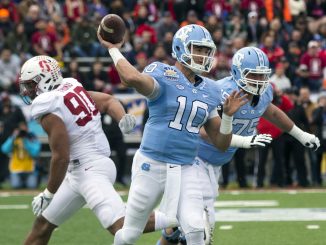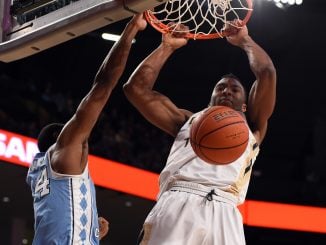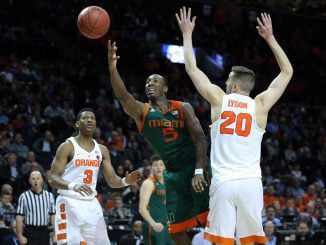
Usain Bolt set the world record in the 2008 Beijing Olympics by running 9.69 seconds in the 100-meter dash. Michael Phelps won four gold medals in the pool to become the most decorated Olympian in history in 2012 at London.Two of the most memorable performances in recent Olympic history took place four years and more than 5,000 miles apart, but Kevin Best was there to see both of them.Best is known to Triangle-area athletes and media as UNC’s Assistant Athletic Director for Communications. He serves as the Sports Information Director for the Tar Heel football team, but the school allows him to moonlight in a job most people only dream about.Best left for Rio de Janeiro on July 29 to work his 10th Olympic Games, including every Winter and Summer Games since the turn of the millennium.The 20-year Olympic career began when Best happened to be in the right place at the right time. A 1993 UNC graduate, Best’s first job out of college was in the University of Georgia Sports Information office. At the time, a new division of the IOC was planning for the 1996 Summer Olympics, to be held in nearby Atlanta.”They went around looking for people to work the Games,” Best said. “I was an intern. I didn’t know what else I’d be doing in two years, so I said I’d do it.”The new organization, now known as Olympic Broadcasting Services, was responsible for providing the worldwide feed of the Games.”Before that,” Best explained, “the host country’s rights holder was responsible for the worldwide feed.” For example, in 1984, when the Summer Olympics were in Los Angeles, ABC had to provide the rest of the world with video of their athletes.”That was difficult to do,” Best said. “If you’re the rights holder for the United States, you want to show American athletes. You don’t want to be burdened with trying to show every other athlete too.”The OBS was created to provide an unbiased feed of every competitor in every event.”We show every athlete the same way,” Best said. “For instance, in slalom, you might have 118 competitors. We show every single competitor coming down the mountain, with the same camera shots, the same angles. So if the 118th place athlete is from Thailand, the Thailand rights holder can get the footage. They can broadcast it live. They can talk over it with their own commentators. Or they can just use the footage later on for highlights.”Best’s role in the organization is similar to what he does with UNC football. He manages the rights holders from every country around the world, to make sure they’re getting what they need for their broadcast.While most of the journalists at a UNC football game have been there before, leaving Best to help out the handful of newcomers, the Olympics are a different story.”Pretty much everyone there is a first-timer,” Best said. “They all come there and want to know, ‘Where do I go? Where can I be? Where can I set up cameras? Where do I get interviews? How do I do that?’ We’re the media-relations staff for the TV rights holders.”The challenge of the job comes in the post-event mix zone, an area where the athletes interact with the media that has the potential to become chaotic.”You think of a UNC football game that’s on ESPN,” Best said. “The game ends, and ESPN’s sideline reporter comes onto the field and wants that immediate post-game interview.”At the Olympics, every country with an athlete in the event has their own version of an ESPN sideline reporter, wanting the immediate reaction from their own athlete. Best and his staff are the ones to make sure that happens.”Now, if Usain Bolt sets a world record, when he hits that mix zone, everyone’s going to want to talk to him,” Best pointed out. “Who gets the first interview? The fourth? It’s going to be a lengthy process. For instance, in Brazil, their rights holder is TV Globo. They’ll get the first interview, followed by NBC. We might not get to Jamaica [Bolt’s home country] until interview number 62.”In the 96 Games, Best didn’t have to worry about coordinating interviews for any record setters. “I had worked with the Georgia gymnastics team, and [in the two years between his internship and the Olympics] I’d gotten a full time job at Nebraska, working with the volleyball team. So in 96, they had me work the preliminary rounds of volleyballjust the round-robin pool play, not the medal roundand rhythmic gymnastics, with the ribbon and the ball. And I thought that was going to be the only Olympics I ever worked.”In 2000, however, the OBS came calling again, and Best was on his way to Sydney. He worked Beach Volleyball in Sydney and Athens, track & field and the opening and closing ceremonies in Beijing and aquatics for London and Rio. He’s also done alpine skiing three times in the Winter Olympics and hockey once.The timing of the Summer Olympics poses a bit of a logistical problem for Best’s day job. He left for Rio just as Carolina’s preseason football camp opened, meaning he’s leaving the team in the hands of assistants for over two weeks. His last Summer Games, London 2012, took him away from UNC for the start of Larry Fedora’s first season as Tar Heel coach.”Carolina has been great about working with me,” Best said. “Bubba [Cunningham] and all the other athletic directors put a priority on professional development, and I really feel like this is an important part of my professional development. All the coaches [including Fedora] have been great. I miss part of preseason camp, but I’m back in plenty of time for the first game.”Best has helped the world’s media tell the big stories”With Usain Bolt, I just remember all of us literally trying to hold up the bike barricade to keep the media from crushing him in the mix zone,” he saidand the smaller ones.”The only Mexican skier is also a prince [Prince Hubertus of Hohenlohe-Langenburg] and he competes every year,” Best said. “He was in Sochi in 2014, and I think he was 55 years old,” Best said. “There was also a Thai skier [Vanessa Vanakorn] who was also a world-renown violinist.”Rather than any one individual moment, however, Best’s favorite Olympic memory is the chance to work with people around the world. “In Beijing, my assistant was from Trinidad & Tobago,” Best recalled. “And we had another assistant from Australia and one from France. Then we were assigned students from around the world to help out.”It sounds corny, but you have people from all walks of life, speaking different languages, coming together to pull off the biggest sporting event in the world.”



